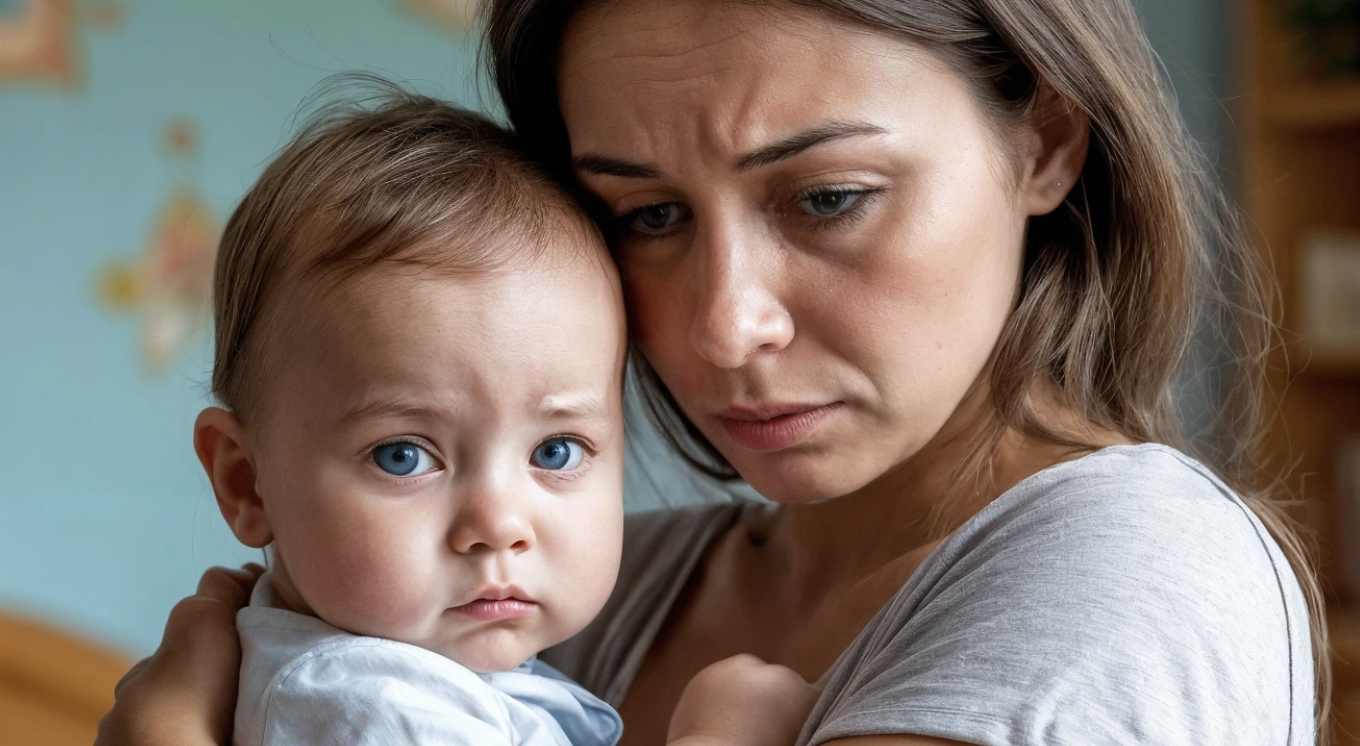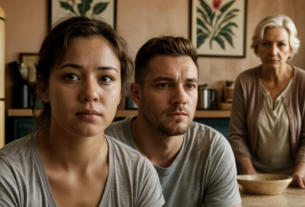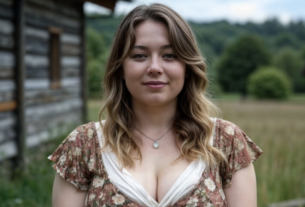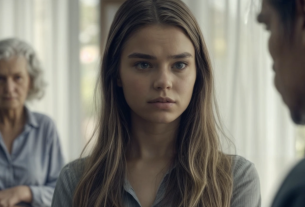I still remember that day — as if it collided with my life forever.
The doctor was holding the X-rays, quickly speaking about abnormalities, areas of damage, and functional deviations. The words flew through me like wind through an empty window. I sat there, unwilling to understand. I couldn’t.
But one sentence pierced my heart like lightning:
“Speech will never develop. Not now. Not later. He will never speak.”
A cold office, a hard chair, the doctor’s white coat. And my little son — warm, alive, trustingly nestled against my chest. He was peacefully sleeping, his tiny body trembling in his sleep, and I… I seemed to go deaf. The doctor’s voice became background noise, a distant, meaningless hum. Only that phrase — black, sharp, in my heart — stayed with me forever.
He will never be able to speak.
He will never say “mama,” never tell of fear, of a dream. He will never ask why the sky is blue, or who lives behind the moon. He will never utter a single word.
I didn’t believe it.
I simply couldn’t believe it.
It was a mistake. Definitely a mistake. He’s only a few months old — he’s just developing more slowly than others. He needs a good specialist. A speech therapist. Massages. Maybe some procedures? Courses? Rehabilitations?
“We’ve done everything that’s possible,” the doctor said. “He has severe damage to the central nervous system. The speech centers are not activated. This cannot be corrected.”
And at that moment, I stopped feeling the ground beneath my feet. The room swam, my thoughts scattered. I hugged my son so tightly, as if I could destroy the diagnosis with my warmth, as if my love alone could repair the damaged connections in his brain.
And he slept. Peacefully. Without fear. Without pain.
And inside me, a scream tore at me, one that couldn’t be released.
The pregnancy was unexpected. But it became light, a gift, a hope.
Anton was happy. He dreamed of becoming a father. We lived modestly, renting a one-bedroom apartment, but we made plans. About a house. About kindergarten. About school.
Every evening, he would place his hand on my belly and say:
“Do you hear? This is our baby. He’ll be strong, like his dad. Smart, like his mom.”
I laughed, pressing against him. We picked a name by letters, to make it sound beautiful. We thought about the nursery, the crib, the first toys.
The pregnancy was difficult. Nausea, weakness, worries. But I endured — for that movement inside, for his first breath. For him.
When premature labor started, I was scared. But Anton was there. He held my hand in the delivery room, slept in the hospital hallway, bought every IV the doctors asked for.
My son was born too small. Too fragile. With insufficient weight, with hypoxia, with an oxygen mask and tubes. I never left the incubator for a minute.
When we were finally discharged home, I thought: now it will be easier. Now a new, good life will begin.
But the months passed — and he was silent.
He didn’t coo. He didn’t babble. He didn’t respond to his name.
I told the doctors — they replied:
“Wait, children develop differently.”
He turned one — not a single word.
One and a half — didn’t point with his finger, didn’t ask to be picked up, didn’t look into eyes.
I spent sleepless nights browsing medical sites, forums, parent stories. Searching for answers. Searching for hope. I tried everything: developmental games, Domans cards, massages, music, speech therapy classes.
Sometimes it seemed to me — here it is, the moment! He understood! He’s going to say it now!.. But silence remained.
And then we got the diagnosis.
Anton began to go silent.
At first, he yelled — at the doctors, at life, at me.
Then he stopped speaking altogether. Only looks. And silence.
He stayed at work late.
Then he began to come home late.
And then he just… didn’t return home on time.
And one day he said this:
“I can’t live like this anymore. It hurts. I don’t want to see his suffering. I can’t stand it.”
I sat with my son in my arms. He was sleeping, pressed against my shoulder. I was silent.
“Sorry,” Anton said. “I’m leaving.”
He left for a woman who had a healthy child.
A child who laughs, runs, says “mama.”
And I was left alone.
With my boy. With my love. With my pain.
I cannot weaken.
There is no day when I can allow myself to rest.
No minute when I can close my eyes and forget.
My son doesn’t speak. He can’t feed himself, dress himself, ask for water, or say what hurts.
When he cries, it’s not whims — it’s a scream he can’t make with his voice.
At night, he almost never sleeps.
Neither do I.
During the day — endless sessions: development, massages, therapy, gymnastics.
I keep a journal, so I don’t forget anything: medicines, schedules, reactions.
I work nights.
Remotely. Sometimes odd jobs for pennies, sometimes just to keep from losing my mind.
We live on benefits and disability pensions.
On promises. On hope. On love that never runs out.
I am no longer a woman.
Not a daughter.
Not a friend.
I am a mother.
His mother.
His voice.
His world.
One day, in a store, my child cried — he was frightened by a loud sound.
People looked at him like he was a stranger.
Like he was abnormal.
One woman whispered to her husband, as if I couldn’t hear:
“Why do they have children like that?”
I left with my shopping half done, shaking hands, and tears I couldn’t stop.
At the clinic, the doctor didn’t even look at us and said:
“Do you still hope he will speak? That’s an abstraction. A dream. You need to accept reality.”
How do you accept it when your heart breaks every day?
He doesn’t speak, but he feels.
He laughs when he hears music.
He hugs me when I cry.
He reaches for me. Kisses my cheek. Tries to comfort me.
One day I cried in the corner of the room, and he ran up, pressed his tiny hand to my face.
No words. No sound.
But I heard him.
Through the silence.
It was an ordinary morning. We were heading to the rehabilitation center — our rare but important meeting with hope.
At the bus stop, my son cried again — a schoolboy screamed nearby, and my boy got scared.
I knelt down, trying to calm him, while barely holding back tears.
“Can I help?” A soft, warm voice asked.
A woman in her forties stood in front of me. Smiling. Calm. As if she knew what I was going through.
I nodded. She helped me seat my son on the bus. Then we just talked.
Her name was Vera.
It turned out she also had a child with developmental disabilities. He’s 17 now.
He also never learned to speak. But he communicates with gestures. Through a tablet. Through love.
“It all started with pain,” she admitted. “But then I realized: normal is what we create ourselves.”
I listened to her — and for the first time in a long while, I felt something thawing inside me.
I am not alone.
There are others like me.
And they live.
They laugh.
They weren’t broken.
Since then, we’ve started meeting. We walked together, shared stories, advice.
Vera taught me to use alternative communication methods: gestures, cards, apps.
But most importantly — she didn’t pity me.
She believed in me.
One day she said:
“You are all pain, but you keep going. That’s real strength.”
Those words stayed with me forever.
Six months later, I created an online club for moms like me.
We shared methods, supported each other, sometimes just said, “I made it today.”
One girl wrote:
“I wanted to give up, to leave. But I read your post and stayed.”
Another thanked me for my honesty:
“You don’t ask for pity. You just tell the truth.”
And then I understood:
My pain became a meaning.
If I can help someone — then my son and I are not living in vain.
That means even silence can become a voice.
Even a shadow — can become light.
Three years have passed.
My son still doesn’t speak.
But he looks me straight in the eyes — and I see love there, more than words can express.
He smiles — with his warm, bright smile that melts even the coldest despair.
He hugs me so tightly, that you forget everything.
He learned to speak with his hands — he shows “I love you” with a gesture that’s worth a thousand words.
He can press buttons on a tablet:
“I’m hungry.”
“Let’s play.”
“Mama.”
And recently, he did something that made my heart break into a thousand tiny pieces.
He pressed three words in a row:
“Mama. Heart. Good.”
I cried like never before.
Not from pain.
From love.
From gratitude.
From the realization that he understands, that he feels, that he’s with me.
Maybe he won’t say “mama” with his voice.
But he says it with his whole being.
And I know it.
Sometimes I remember Anton.
Not with hatred. Not with resentment.
Sometimes — with pain.
Sometimes — with pity.
He couldn’t take it.
He left.
He broke under the weight of fear and hopelessness.
Now I understand: not everyone can be strong.
Not everyone can stay when the world falls apart.
I forgave him.
Not for him.
For myself.
So I wouldn’t carry that stone in my soul anymore.
Now, looking at my reflection in the mirror, I see a woman.
Tired.
With wrinkles that appeared not only from time.
With a body that was changed by years of sleepless nights and worries.
But behind this appearance — is a person who has been through hell.
A person who didn’t break.
A person who didn’t give up.
A person who chose love over escape.
I’m not a goddess.
Not a saint.
I’m just a mother.
Who loves her son.
More than life.
More than fear.
More than anything.
And if someone offered me an ideal life — without pain, without suffering, but also without him…
I would say: no.
Because he — is my life.
We are special mothers.
We know sleepless nights not for romantic reasons, but because someone is crying, needs us, is scared.
We’ve faced judgment, indifference, cruel words.
We’ve experienced pain that cannot be described in words.
And we love — with such a vast, boundless love, that it could light up an entire universe.
We are not weak.
We are the ones who stayed when others left.
We are the support for those who can’t stand on their own.
We are the voice for those who can’t speak yet.
If you’re reading these lines and it’s hard for you — know:
You are not alone.
You’ve already come further than you thought possible.
And you will make it.
Because you are a mother.
And you are stronger than you think.



